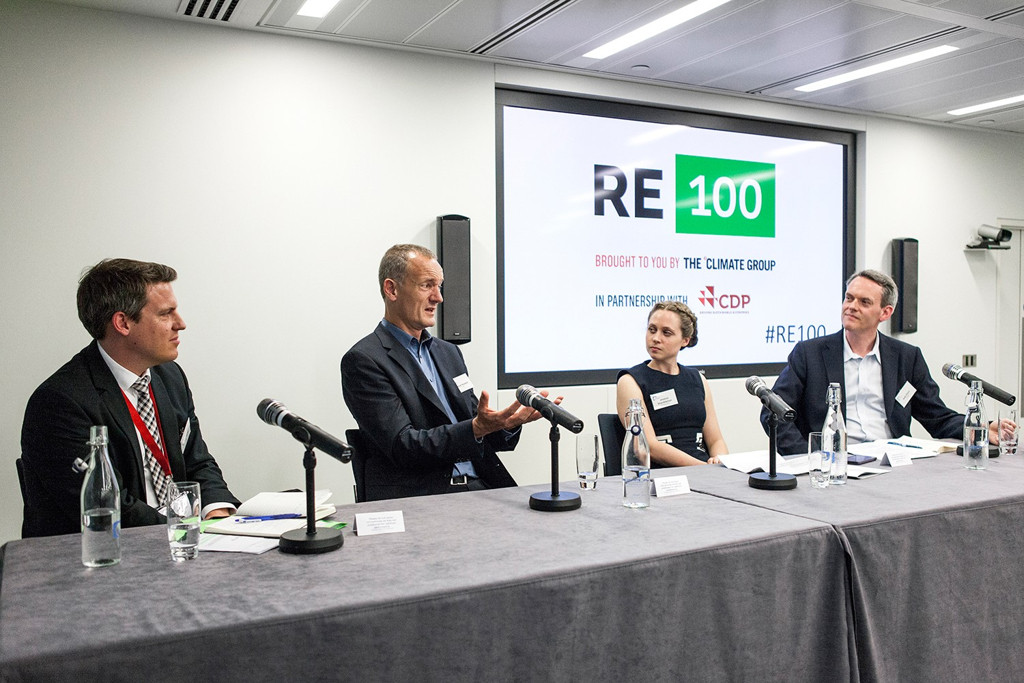RE100 campaign building corporate demand for renewables – panel discussion, Business & Climate Summit
RE100
Policy uncertainty remains the biggest challenge to companies working towards 100% renewable electricity globally, but RE100 is demonstrating that corporate demand is on the rise – sending a clear market signal to policy makers and investors that renewables are a safe bet.
This was one of the main conclusions of a RE100 panel discussion hosted by global law firm DLA Piper, immediately after the close of the Business & Climate Summit in London.
Steve Howard, Chief Sustainability Officer at IKEA; Iarla Flynn, Director of Public Policy and Government Affairs; and Simon Heller, Group Head of Environmental Management at UBS joined moderator Jessica Shankleman, Renewable Energy Reporter at Bloomberg News, and over 100 guests from RE100 companies, energy solution providers and RE100 partner organisations, to share their company’s progress towards their 100% goals, and discuss what needs to happen now and in the future to accelerate the take up of renewables around the world.

Steve Howard reflected on how the RE100 campaign has grown rapidly since its launch in September 2014. He said it sent “a clear signal that renewables are the future”.
IKEA is committed to generating as much renewable energy as it consumes by 2020. Last year, 53% of the company’s global electricity use was being sourced from renewables. Howard said that renewables were now “an unshakable path” for IKEA – the company invests in renewable energy just as it invests in new stores, and sees the benefits of setting a 100% goal to ensure that all of its staff get behind it.
Google has also been a big advocate of renewable energy and is committed to sourcing 100% renewable electricity. On joining RE100 just ahead of COP21 in Paris last December, the company set an interim target to triple its renewable energy purchasing by 2025.
Speaking on the RE100 panel, Iarla Flynn said that its data centers were not always located in the best places for generating renewable energy on site, and for that reason Google was focusing on greening the grid. Google buys wind power via Power Purchase Agreements (PPAs) – which Flynn said also provides commercial certainty for the developer.
Howard and Flynn agreed that business also needs to see policy certainty, long term targets and investment security from governments. Google has recently announced it will be working with others to better understand energy policy and make recommendations on how to further unlock corporate renewable energy use.

The panel agreed that it is harder to source 100% renewable electricity in emerging markets, but that the challenges could be overcome if the business case was clear. As the number of companies committed to renewables continues to grow, it will show investors and governments that they should be supporting the development of new renewable energy projects.
Simon Heller of UBS highlighted the value RE100 offers its members through knowledge sharing activities and peer-to-peer learning – the campaign runs a series of workshops exploring options for going renewable in different market contexts, including India and China.
After the panel discussion came to a close there were questions – and praise – from the audience. Nina Skorupska, CEO of the Renewable Energy Association, applauded RE100 and its members for their commitment to renewable power, when it appeared to be lacking from some governments. This commitment was vital for the renewable energy industry, she said.
Following the Q&As there was a drinks reception allowing guests from RE100 member companies as well as those interested in joining and supporting the campaign, to network with key stakeholders in the room.

To find out more about RE100 company commitments to 100% renewable power, watch The Climate Group’s exclusive interviews with Steve Howard from IKEA, and Gary Demasi and John Woolard from Google, on Climate TV.

